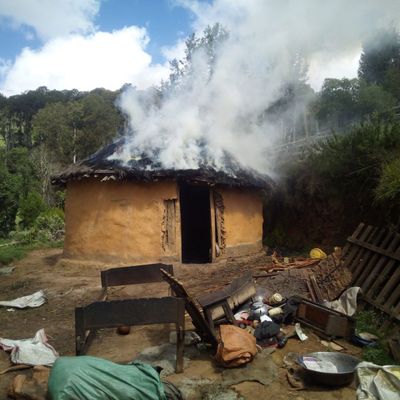
“There’s big money to be made in forests across Africa,” says Anjali Nayar, a Canadian scientist turned journalist turned activist who founded the company TIMBY in Nairobi in 2012. With big money comes big pressure, especially on the people who live in those forests — like the Sengwer people, an indigenous community that lives in the Embobut forest in western Kenya. “People get evicted, often forcefully,” says Nayar. “People die, and there’s an uproar, then it dies down and happens again in another couple years.”
TIMBY, which stands for “This Is My Backyard,” is an app and a platform designed to make it easy and safe for people around the world to tell their stories. That description, though, probably makes the app sound less vital than it is; what the app really is is a system that simplifies and securely encrypts evidence, like videos and photos, in a way that they can be accessed later for legal or publicity reasons.
The Embobut is a large patch of land that has long been home to the Sengwer, but not through official means. They aren’t the legal landowners. The Kenyan government, as well as private companies, see value in the forest: It can provide lumber, or water, or be a magnet for funding from agencies like the World Bank, which might pay to rope it off. None of this is compatible with people living there, which has led to sometimes violent conflicts. Late last year, a Sengwer man was killed, houses were burned, and livestock shot by the Kenya Forest Service as part of a forced eviction. The reason? Funding from the E.U. to conserve water.
Some of the causes are good ones, but the knee-jerk reaction to expel people from the forest is not necessarily correct. Amnesty International and the U.N. both condemned the actions, imploring the Kenyan government to make the Sengwer part of the forest conservation rather than outside of it. The actions have been declared illegal and in violation of various U.N. safeguards, but they continue because, well, money.
A fundamental problem for the Sengwer is in gathering evidence. Sengwer people have undertaken the long, rough trip to towns and cities to plead their cases, but, says Nayar, those testimonies turn into discussions of whether the violations actually happened, rather than how to mitigate and solve the problems.
TIMBY is an app that allows for the quick taking of photos and videos on a smartphone, which are highly encrypted. If the user has internet access, the data will be uploaded to the cloud, which means that confiscations or hacking of phones isn’t really an issue. None of the files are actually viewable or deletable on the device unless you have a key. For those who don’t have constant-on internet access, like the Sengwer, the app can save their footage into an encrypted ZIP file, which can be transferred to couriers — journalists, scientists, community monitors. When those couriers get back to a place with internet access, it’ll be uploaded, safe and sound.
The app is customized for each use case. For the Sengwer, the app has to be extremely direct, as most of the Sengwer, says Nayar, are semi-literate. The app has color-coded navigation for taking and sending footage directly to, for example, paralegals who can represent them in court. The TIMBY team is also working on a sort of panic feature: When a certain password is entered, the app will completely erase all local data, and send a GPS ping of the user’s location.
TIMBY is designed to change as the need arises; it is free, funded by various sources, including the Ford Foundation and Making All Voices Count, and the team makes it a point to learn exactly what each community needs. And now, the Sengwer can avoid the entire conversation about whether what’s happening to them is actually happening. Now, says Nayar, “they’re talking about something with concrete evidence, and then the conversation can be about what to do about it.”

